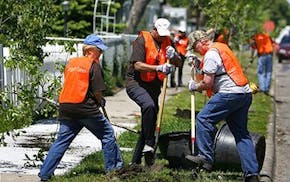September has brought to the Twin Cities an unprecedented parade of popular music's performing masters: The newly minted (Coldplay's Chris Martin), the one not many knew about (Green Day's Billie Joe Armstrong) and, of course, the veterans (Mick Jagger of the Rolling Stones, Bono of U2 and even the eternally unhip Neil Diamond, who satisfies his faithful like Bruce Springsteen does his).
On Friday in front of an arena-record 20,240 people at Target Center, Bono proved why he stands alone. First of all, he has the best band (more on that later). While the music world is full of kings and princes, gods and goddesses, Bono stands as the pope of pop.
Not only is he music's conscience onstage and off, but his mere presence can carry a show. Unlike Jagger, Armstrong or Martin, Bono, 45, didn't rely on physicality on Friday. Rather, he moved like a mime in slow motion, not a rock star in overdrive. He could reach out and touch the huge throng with his sincerity and spirit -- or just literally with his hand.
During "Beautiful Day," a parent in front of the stage held up a young boy and, as Bono sang, he held the boy's left hand and the kid's right index finger pointed at Bono, bouncing perfectly to the beat, as if to say "you da man."
Similarly, before "Elevation," a young woman held up a sign declaring "I lost 75 lbs to dance with you."
Bono invited her onstage and announced, "You know Irish men don't dance. We do lots of other things." Then, of course, he danced with her and kissed her on the hand.
For 2 1/4 hours, Bono came across as part politician, part preacher -- and all passion. His crusades and campaigns were not about rebellion but about unity. "Coexist" was the word he wore on his headband, with the C being a Muslim crescent moon, the X a Star of David and the T a cross. He acknowledged the hurricane hardships and recoveries in the South, declaring, "We're so proud to see America at its best."
Bono also thinks globally, translating Zulu words, scrolling the Declaration of Human Rights across a giant screen and preaching that Martin Luther King's dream is "a European dream, an Asian dream, an African dream."
Sometimes Bono seemed pompous and pretentious (especially the hokey blindfolded prisoner-of-war bit) but there were enough self-deprecating moments to deflate his big head. (Best: When he was doing "Miss Sarajevo," which he'd recorded with Pavarotti, he said, "He's not here, but I've been putting on a little bit of weight.")
Indeed, Bono seemed like Pavarotti, Springsteen, King and Nelson Mandela all rolled into tight black jeans, a black leather jacket and wraparound sunglasses. He occasionally stepped out of that persona, especially during "Sometimes You Can't Make It on Your Own." Dedicating the song to his late father, he shed the shades and offered his most emotional vocal, his eyes filled with bittersweet tears.
Bono could not have pulled all this off without the rest of U2. Drummer Larry Mullen Jr. and bassist Adam Clayton were the engine that drove the heroic sound. And it was the Edge, a true rock original, and his mostly subtle and always sublime guitar that made things magnificent. He provided the metallic fury during "Bullet the Blue Sky," the grace during "Yahweh" and the dizzying circular patterns during "Vertigo," which U2 curiously performed twice.
"In Italian, encore means play the song a second time," Bono joked before the finale. The pope of pop knows a good benediction -- even if it's a roaring one.

Yuen: Why do people forgive? It's messy, complex and 'the best form of self-interest'

Critics' picks: The 12 best things to do and see in the Twin Cities this week
How the Goo Goo Dolls learned the music biz from Minneapolis bands
